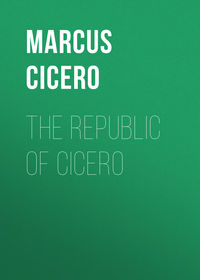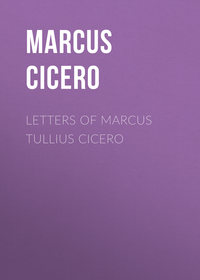 полная версия
полная версияThe Letters of Cicero, Volume 1
XIII. There is one thing on which I shall not cease from giving you advice, nor will I, as far as in me lies, allow your praise to be spoken of with a reservation. For all who come from your province do make one reservation in the extremely high praise which they bestow on your virtue, integrity, and kindness—it is that of sharpness of temper. That is a fault which, even in our private and everyday life, seems to indicate want of solidity and strength of mind; but nothing, surely, can be more improper than to combine harshness of temper with the exercise of supreme power. Wherefore I will not undertake to lay before you now what the greatest philosophers say about anger, for I should not wish to be tedious, and you can easily ascertain it yourself from the writings of many of them: but I don't think I ought to pass over what is the essence of a letter, namely, that the recipient should be informed of what he does not know. Well, what nearly everybody reports to me is this: they usually say that, as long as you are not out of temper, nothing can be pleasanter than you are, but that when some instance of dishonesty or wrong-headedness has stirred you, your temper rises to such a height that no one can discover any trace of your usual kindness. Wherefore, since no mere desire for glory, but circumstances and fortune have brought us upon a path of life which makes it inevitable that men will always talk about us, let us be on our guard, to the utmost of our means and ability, that no glaring fault may be alleged to have existed in us. And I am not now urging, what is perhaps difficult in human nature generally, and at our time of life especially, that you should change your disposition and suddenly pluck out a deeply-rooted habit, but I give you this hint: if you cannot completely avoid this failing, because your mind is surprised by anger before cool calculation has been able to prevent it, deliberately prepare yourself beforehand, and daily reflect on the duty of resisting anger, and that, when it moves your heart most violently, it is just the time for being most careful to restrain your tongue. And that sometimes seems to me to be a greater virtue than not being angry at all. For the latter is not always a mark of superiority to weakness, it is sometimes the result of dullness; but to govern temper and speech, however angry you may be, or even to hold your tongue and keep your indignant feelings and resentment under control, although it may not be a proof of perfect wisdom, yet requires no ordinary force of character. And, indeed, in this respect they tell me that you are now much more gentle and less irritable. No violent outbursts of indignation on your part, no abusive words, no insulting language are reported to me: which, while quite alien to culture and refinement, are specially unsuited to high power and place. For if your anger is implacable, it amounts to extreme harshness; if easily appeased, to extreme weakness. The latter, however, as a choice of evils, is, after all, preferable to harshness.
XIV. But since your first year gave rise to most talk in regard to this particular complaint—I believe because the wrong-doing, the covetousness, and the arrogance of men came upon you as a surprise, and seemed to you unbearable —while your second year was much milder, because habit and reflexion, and, as I think, my letters also, rendered you more tolerant and gentle, the third ought to be so completely reformed, as not to give even the smallest ground for anyone to find fault. And here I go on to urge upon you, not by way of exhortation or admonition, but by brotherly entreaties, that you would set your whole heart, care, and thought on the gaining of praise from everybody and from every quarter. If, indeed, our achievements were only the subject of a moderate amount of talk and commendation, nothing eminent, nothing beyond the practice of others, would have been demanded of you. As it is, however, owing to the brilliancy and magnitude of the affairs in which we have been engaged, if we do not obtain the very highest reputation from your province, it seems scarcely possible for us to avoid the most violent abuse. Our position is such that all loyalists support us, but demand also and expect from us every kind of activity and virtue, while all the disloyal, seeing that we have entered upon a lasting war with them, appear contented with the very smallest excuse for attacking us. Wherefore, since fortune has allotted to you such a theatre as Asia, completely packed with an audience, of immense size, of the most refined judgment, and, moreover, naturally so capable of conveying sound, that its expressions of opinion and its remarks reach Rome, put out all your power, I beseech you, exert all your energies to appear not only to have been worthy of the part we played here, but to have surpassed everything done there by your high qualities.
XV. And since chance has assigned to me among the magistracies the conduct of public business in the city, to you that in a province, if my share is inferior to no one's, take care that yours surpasses others. At the same time think of this: we are not now working for a future and prospective glory, but are fighting in defence of what has been already gained; which indeed it was not so much an object to gain as it is now our duty to defend. And if anything in me could be apart from you, I should desire nothing more than the position which I have already gained. The actual fact, however, is that unless all your acts and deeds in your province correspond to my achievements, I shall think that I have gained nothing by those great labours and dangers, in all of which you have shared. But if it was you who, above all others, assisted me to gain a most splendid reputation, you will certainly also labour more than others to enable me to retain it. You must not be guided by the opinions and judgments of the present generation only, but of those to come also: and yet the latter will be a more candid judgment, for it will not be influenced by detraction and malice. Finally, you should think of this—that you are not seeking glory for yourself alone (and even if that were the case, you still ought not to be careless of it, especially as you had determined to consecrate the memory of your name by the most splendid monuments), but you have to share it with me, and to hand it down to our children. In regard to which you must be on your guard lest by any excess of carelessness you should seem not only to have neglected your own interests, but to have begrudged those of your family also.
XVI. And these observations are not made with the idea of any speech of mine appearing to have roused you from your sleep, but to have rather "added speed to the runner." For you will continue to compel all in the future, as you have compelled them in the past, to praise your equity, self-control, strictness, and honesty. But from my extreme affection I am possessed with a certain insatiable greed for glory for you. However, I am convinced that, as Asia should now be as well-known to you as each man's own house is to himself, and since to your supreme good sense such great experience has now been added, there is nothing that affects reputation which you do not know as well as possible yourself, and which does not daily occur to your mind without anybody's exhortation. But I, who when I read your writing seem to hear your voice, and when I write to you seem to be talking to you, am therefore always best pleased with your longest letter, and in writing am often somewhat prolix myself. My last prayer and advice to you is that, as good poets and painstaking actors always do, so you should be most attentive in the last scenes and conclusion of your function and business, so that this third year of your government, like a third act in a play, may appear to have been the most elaborated and most highly finished. You will do that with more ease if you will think that I, whom you always wished to please more than all the world besides, am always at your side, and am taking part in everything you say and do. It remains only to beg you to take the greatest care of your health, if you wish me and all your friends to be well also.
Farewell.
XXX (a ii, 4)
b.c. 59. Coss., C. Iulius Cæsar, M. Calpurnius Bibulus.
This year was a crucial one in the history of the Republic, and also of Cicero particularly. It witnessed the working of the agreement entered into in the previous year between Pompey, Cæsar, and Crassus, to secure their several objects, commonly called the First Triumvirate. The determined enmity of the consuls to each other, the high-handed conduct of Cæsar in regard to the senate, his ultimate appointment to the unusual period of five years' government of the Gauls and Illyricum, were so many blows at the old constitution; and scarcely less offensive to the Catonian Optimates were the agrarian laws passed in favour of Pompey's veterans, the forcing of his acta through the senate, and the arrangement whereby he too was eventually to have the consulship again, and an extended period of provincial government. Cicero was distracted by hesitation. He had pinned his faith on Pompey's ultimate opposition to Cæsar, and yet did not wholly trust him, and was fully aware of the unpracticable nature of Cato and the weakness of the Optimates. The triumvirs had an instrument for rendering him helpless in Clodius, but Cicero could not believe that they would use it, or that his services to the state could be so far forgotten as to make danger possible. We shall find him, then, wholly absorbed in the question as to how far he is to give into or oppose the triumvirs. It is not till the end of the year that he begins to see the real danger ahead. We have one extant oration of this year—pro Flacco—which was not much to his credit, for Flaccus had evidently been guilty of extortion in Asia. He also defended the equally guilty C. Antonius in a speech which brought upon him the vengeance of the triumvirs, but it is happily lost.
TO ATTICUS (AT ROME)
Tusculum (April)
b.c. 59, æt. 47
I am exceedingly obliged to you for sending me Serapio's book, of which indeed, between you and me, I scarcely understood a thousandth part. I have ordered the money for it to be paid you at once, that you may not put it down to the cost of presentation copies. But as I have mentioned the subject of money, I will beg you to try to come to a settlement with Titinius in any way you can. If he doesn't stand by his own proposal, what I should like best is that what he bought at too dear a rate should be returned, if that can be done with Pomponia's consent: if that too is impossible, let the money be paid rather than have any difficulty. I should be very glad if you would settle this before you leave Rome, with your usual kindness and exactness.
So Clodius, you say, is for Tigranes? I only wish he would go—on the same terms as the Skepsian!189 But I don't grudge him the job; for a more convenient time for my taking a "free legation" is when my brother Quintus shall have settled down again, as I hope, into private life, and I shall have made certain how that "priest of the Bona Dea"190 intends to behave. Meanwhile I shall find my pleasure in the Muses with a mind undisturbed, or rather glad and cheerful; for it will never occur to me to envy Crassus or to regret that I have not been false to myself. As to geography, I will try to satisfy you, but I promise nothing for certain.191 It is a difficult business, but nevertheless, as you bid me, I will take care that this country excursion produces something for you. Mind you let me know any news you have ferreted out, and especially who you think will be the next consuls. However, I am not very curious; for I have determined not to think about politics. I have examined Terentia's woodlands. What need I say? If there was only a Dodonean oak in them, I should imagine myself to be in possession of Epirus. About the 1st of the month I shall be either at Formiæ or Pompeii.192 If I am not at Formiæ, pray, an you love me, come to Pompeii. It will be a great pleasure to me and not much out of the way for you. About the wall, I have given Philotimus orders not to put any difficulty in the way of your doing whatever you please. I think, however, you had better call in Vettius.193 In these bad times, when the life of all the best men hangs on a thread, I value one summer's enjoyment of my Palatine palæstra rather highly; but, of course, the last thing I should wish would be that Pomponia and her boy should live in fear of a falling wall.
XXXI (a ii, 5)
TO ATTICUS (AT ROME)
Antium (April)
b.c. 59, æt. 47
I wish very much, and have long wished, to visit Alexandria, and at the same time to get away from here, where people are tired of me, and return when they have begun to feel my loss—but at such a time and at the bidding of such statesmen!194
"I fear to face the men of TroyAnd Trojan matrons with their trailing robes."195For what would my friends the Optimates say—if there are such persons left? That I had accepted a bribe to change my views?
"Polydamas the first would lay the charge."I mean my friend Cato, who is as good as a hundred thousand in my eyes. What, too, will history say of me six hundred years hence? I am much more afraid of that than of the petty gossip of the men of to-day. But, I think, I had better lie low and wait. For if it is really offered to me, I shall be to a certain extent in a position of advantage, and then will be the time to weigh the matter. There is, upon my word, a certain credit even in refusing. Wherefore, if Theophanes196 by chance has consulted you on the matter, do not absolutely decline. What I am expecting to hear from you is, what Arrius says, and how he endures being left in the lurch,197 and who are intended to be consuls—is it Pompey and Crassus, or, as I am told in a letter, Servius Sulpicius with Gabinius?—and whether there are any new laws or anything new at all; and, since Nepos198 is leaving Rome, who is to have the augurship—the one bait by which those personages could catch me! You see what a high price I put on myself! Why do I talk about such things, which I am eager to throw aside, and to devote myself heart and soul to philosophy. That, I tell you, is my intention. I could wish I had done so from the first. Now, however, that I have found by experience the hollowness of what I thought so splendid, I am thinking of doing business exclusively with the Muses. In spite of that, please give me in your next some more definite information about Curtius and who is intended to fill his place, and what is doing about P. Clodius, and, in fact, take your time and tell me everything as you promise; and pray write me word what day you think of leaving Rome, in order that I may tell you where I am likely to be: and send me a letter at once on the subjects of which I have written to you. I look forward much to hearing from you.
XXXII (a ii, 6)
TO ATTICUS (AT ROME)
Antium (April)
b.c. 59, æt. 47
As to my promise to you in a former letter that there should be some product of this country excursion, I cannot confirm it to any great extent: for I have become so attached to idleness that I cannot be torn from its arms. Accordingly, I either enjoy myself with books, of which I have a delightful stock at Antium, or I just count the waves—for the rough weather prevents my shrimping! From writing my mind positively recoils. For the geographical treatise, upon which I had settled, is a serious undertaking: so severely is Eratosthenes, whom I had proposed as my model, criticised by Serapio and Hipparchus: what think you will be the case if Tyrannio199 is added to the critics? And, by Hercules, the subject is difficult of explanation and monotonous, and does not seem to admit of as much embellishment as I thought, and, in short—which is the chief point—any excuse for being idle seems to me a good one: for I am even hesitating as to settling at Antium and spending the rest of my life there, where, indeed, I would rather have been a duovir200 than at Rome. You, indeed, have done more wisely in having made yourself a home at Buthrotum. But, believe me, next to that free town of yours comes the borough of the Antiates. Could you have believed that there could be a town so near Rome, where there are many who have never seen Vatinius? Where there is no one besides myself who cares whether one of the twenty commissioners201 is alive and well? Where no one intrudes upon me, and yet all are fond of me? This, this is the place to play the statesman in! For yonder, not only am I not allowed to do so, but I am sick of it besides. Accordingly, I will compose a book of secret memoirs for your ear alone in the style of Theopompus, or a more acrid one still.202 Nor have I now any politics except to hate the disloyal, and even that without any bitterness, but rather with a certain enjoyment in writing. But to return to business: I have written to the city quæstors about my brother's affair. See what they say to it, whether there is any hope of the cash in denarii, or whether we are to be palmed off with Pompeian cistophori.203 Farthermore, settle what is to be done about the wall. Is there anything else? Yes! Let me know when you are thinking of starting.
XXXIII (a ii, 7)
TO ATTICUS (AT ROME)
Antium (April)
b.c. 59, æt. 47
About the geography I will think again and again. But you ask for two of my speeches, one of which I did not care to write out because I had ended it abruptly, the other because I did not want to praise the man I did not like. But that, too, I will see about. At all events, something shall be forthcoming to prevent your thinking that I have been absolutely idle. I am quite delighted to hear what you tell me about Publius; pray ferret out the whole story, and bring it to me when you come, and meanwhile write anything you may make out or suspect, and especially as to what he is going to do about the legation. For my part, before reading your letter, I was anxious that the fellow should go, not, by heaven, in order to avoid his impeachment—for I am wonderfully keen to try issues with him—but it seemed to me that, if he had secured any popularity by becoming a plebeian, he would thereby lose it. "Well, why did you transfer yourself to the Plebs? Was it to make a call on Tigranes? Tell me: do the kings of Armenia refuse to receive patricians?" In a word, I had polished up my weapons to tear this embassy of his to pieces. But if he rejects it, and thus moves the anger of those proposers and augurs of the lex curiata,204 it will be a fine sight! By Hercules, to speak the truth, our friend Publius is being treated a little contemptuously! In the first place, though he was once the only man at Cæsar's house, he is not now allowed to be one in twenty:205 in the next place, one legation had been promised him and another has been given. The former fine fat one206 for the levying of money is reserved, I presume, for Drusus of Pisaurum or for the gourmand Vatinius: this latter miserable business, which might be very well done by a courier, is given to him, and his tribuneship deferred till it suits them. Irritate the fellow, I beg you, as much as you can. The one hope of safety is their mutual disagreement, the beginning of which I have got scent of from Curio. Moreover, Arrius is fuming at being cheated out of the consulship. Megabocchus and our blood-thirsty young men are most violently hostile. May there be added to this, I pray, may there be added, this quarrel about the augurate! I hope I shall often have some fine letters to send you on these subjects. But I want to know the meaning of your dark hint that some even of the quinqueviri207 are speaking out. What can it be? If there is anything in it, there is more hope than I had thought. And I would not have you believe that I ask you these questions "with any view to action,"208 because my heart is yearning to take part in practical politics. I was long ago getting tired of being at the helm, even when it was in my power. And now that I am forced to quit the ship, and have not cast aside the tiller, but have had it wrenched out of my hands, my only wish is to watch their shipwreck from the shore: I desire, in the words of your favourite Sophocles,
"And safe beneath the roofTo hear with drowsy ear the plash of rain."As to the wall, see to what is necessary. I will correct the mistake of Castricius, and yet Quintus had made it in his letter to me 15,000, while now to your sister he makes it 30,000.209 Terentia sends you her regards: my boy Cicero commissions you to give Aristodemus the same answer for him as you gave for his cousin, your sister's son.210 I will not neglect your reminder about your Amaltheia.211 Take care of your health.
XXXIV (a ii, 8)
TO ATTICUS (AT ROME)
Antium, April
b.c. 59, æt. 47
When I had been eagerly expecting a letter from you as usual till evening, lo and behold a message that slaves have come from Rome. I summon them: I ask if they have any letters. "No," say they. "What do you say," said I, "nothing from Pomponius?" Frightened to death by my voice and look, they confessed that they had received one, and that it had been lost on the journey. Need I say more? I was intensely annoyed. For no letter has come from you for the last few days without something in it important and entertaining. In these circumstances, if there was anything in the letter, dated 15th April, worth telling, pray write at once, that I may not be left in ignorance; but if there was nothing but banter, repeat even that for my benefit. And let me inform you that young Curio has been to call on me. What he said about Publius agreed exactly with your letter. He himself, moreover, wonderfully "holds our proud kings in hate."212 He told me that the young men generally were equally incensed, and could not put up with the present state of things. If there is hope in them, we are in a good way. My opinion is that we should leave things to take their course. I am devoting myself to my memoir. However, though you may think me a Saufeius,213 I am really the laziest fellow in the world. But get into your head my several journeys, that you may settle where you intend to come and see me. I intend to arrive at my Formian house on the Parilia (21st April). Next, since you think that at this time I ought to leave out luxurious Crater,214 on the 1st of May I leave Formiæ, intending to reach Antium on the 3rd of May. For there are games at Antium from the 4th to the 6th of May, and Tullia wants to see them. Thence I think of going to Tusculum, thence to Arpinum, and be at Rome on the 1st of June. Be sure that we see you at Formiæ or Antium, or at Tusculum. Rewrite your previous letter for me, and add something new.
XXXV (a ii, 9)
TO ATTICUS (AT ROME)
Antium, May
b.c. 59, æt. 47
Cæcilius215 the quæstor having suddenly informed me that he was sending a slave to Rome, I write these hurried lines in order to get out of you the wonderful conversations with Publius, both those of which you write, and that one which you keep dark, and assert that it would be too long to write your answer to him; and, still farther, the one that has not yet been held, which that Iuno of a woman216 is to report to you when she gets back from Solonium. I wish you to believe that there can be nothing I should like more. If, however, the compact made about me is not kept, I am in a seventh heaven to think that our friend the Jerusalemitish plebeian-maker217 will learn what a fine return he has made to my brilliant speeches, of which you may expect a splendid recantation. For, as well as I can guess, if that profligate is in favour with our tyrants, he will be able to crow not only over the "cynic consular,"218 but over your Tritons of the fish-ponds also.219 For I shall not possibly be an object of anybody's jealousy when robbed of power and of my influence in the senate. If, on the other hand, he should quarrel with them, it will not suit his purpose to attack me. However, let him attack. Charmingly, believe me, and with less noise than I had thought, has the wheel of the Republic revolved: more rapidly, anyhow, than it should have done owing to Cato's error, but still more owing to the unconstitutional conduct of those who have neglected the auspices, the Ælian law, the Iunian, the Licinian, the Cæcilian and Didian,220 who have squandered all the safeguards of the constitution, who have handed over kingdoms as though they were private estates to tetrachs,221 and immense sums of money to a small coterie. I see plainly now the direction popular jealousy is taking, and where it will finally settle. Believe that I have learnt nothing from experience, nothing from Theophrastus,222 if you don't shortly see the time of our government an object of regret. For if the power of the senate was disliked, what do you think will be the case when it has passed, not to the people, but to three unscrupulous men? So let them then make whom they choose consuls, tribunes, and even finally clothe Vatinius's wen with the double-dyed purple223 of the priesthood, you will see before long that the great men will be not only those who have made no false step,224 but even he who did make a mistake, Cato. For, as to myself, if your comrade Publius will let me, I think of playing the sophist: if he forces me, I shall at least defend myself, and, as is the trick of my trade, I publicly promise to











